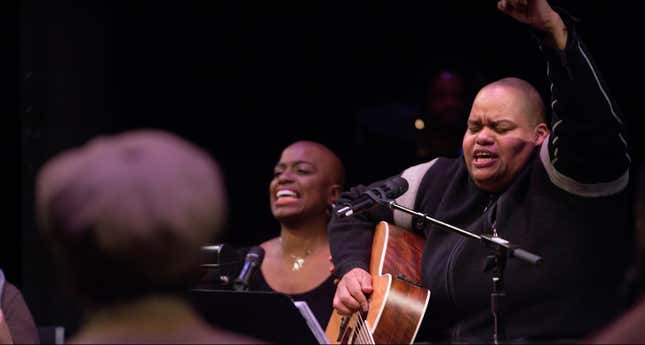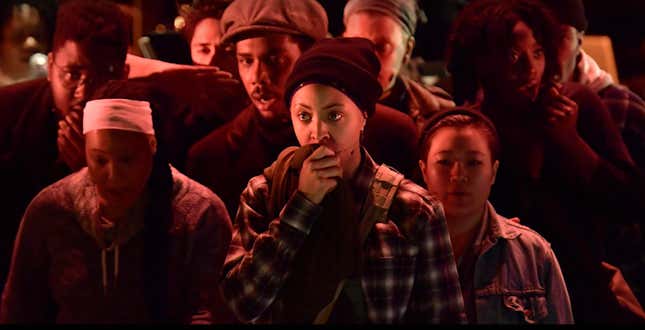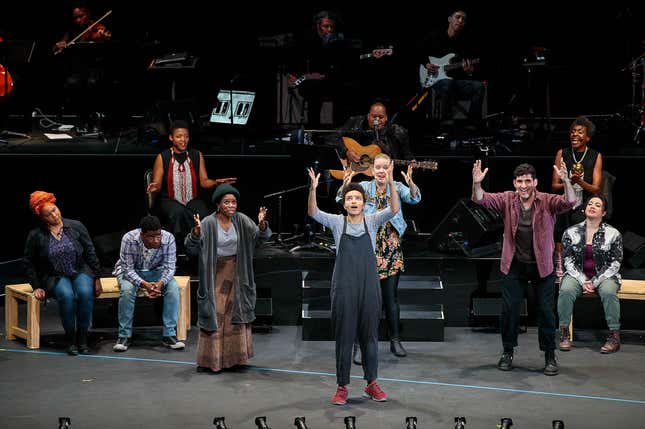
When Octavia Butler published Parable of Sower in 1993, she fictionally forecasted the year 2024 as a dystopia under immoral and ignorant leadership, wracked by climate change and corporate and political avarice. In Butler’s vision of America, our so-called civilized society buckles under unbearable wealth inequality, a lack of basic resources like clean water and adequate housing, and the rise of religious and race-based violence waged by an increasingly desperate population.
In the year 2020, Butler’s imagining of 2024 feels less the Afrofuturist fantasy it seemed when I read Parable of the Sower during college in the mid-’90s—and increasingly like a terrifying inevitability. Singer, songwriter, guitarist and activist Toshi Reagon echoed that sense of foreboding when we spoke about the late author’s landmark novel in early January of this year. “I first read it in 1998, and I was like ‘No way can this possibly happen.’” she recalled. “And as I’ve lived through the years and read the book and over and over, I was like ‘Oh wow, it’s literally happening.’”
Reagon has come to know Parable of the Sower as well as any scholar in the years since being introduced to the novel by her mother and “multiple lifetimes traveling partner” Bernice Johnson Reagon, acclaimed activist, educator, freedom singer and founder of Grammy-nominated musical group Sweet Honey in the Rock. Since gaining the rights to develop the narrative in 2014, the two have transformed Butler’s text into what Reagon’s friend, writer Alexis Pauline Gumbs has dubbed a “congregational opera.” Initially debuting as a concert version in 2015 at both the Public Theater’s Under the Radar Festival and The Arts Center at NYU Abu Dhabi (NYUAD), it made its world premiere at NYUAD in 2017, immediately followed by a US premiere at Carolina Performing Arts at UNC-Chapel Hill, where Reagon is also a fellow.
“It’s like, 200 years of black music in the show, and it’s everything,” she said of the adaptation, which is purely performed in song. “It’s a story that takes place in 2024 but its roots go way before that…we had to move through time.”
To mark Earth Day 2020, NYUAD, in partnership with Carolina Performing Arts, CAP UCLA, and Singapore International Festival of the Arts, is streaming Octavia E. Butler’s Parable of the Sower – The Concert Version today, Wednesday, April 22 at 12 p.m. ET through The Arts Center’s Facebook page. The performance is part of Reconnect, a series of performances from The Arts Center’s archive launched in response to the outbreak of COVID-19 and streamed worldwide in an effort to “bring communities together and inspire audiences through the arts, even in the midst of social distancing.” Immediately following the stream, Reagon and Executive Artistic Director of The Arts Center Bill Bragin will join the online audience for a Q&A moderated by Clinical Associate Professor at the Liberal Studies Program in NYU New York and affiliated faculty member at NYUAD Deborah L. Williams.
“I cannot think of a more relevant or resonant experience to bring to our audiences on Earth Day,” said Bragin in a statement. “The deeply prophetic narrative is a cautionary tale about the environment, exploring communities born of adversity, the central role of empathy in human relationships, and the building of new societies—Earthseed—during a time of great change.”
Like Earthseed, the astral religion created by Butler’s young black heroine Lauren Olamina, the Reagons’ vision is a transformative work-in-progress. Thanks to a “really brave and innovative” collective (including producer Meiyin Wang and director Eric Ting), since 2017, Parable of the Sower has traveled the world, adapting to, including and evolving in response to the communities in which it is activated.
“It comes out of grassroots theater; it comes out of grassroots community building; it’s always presented through a grassroots mechanism,” Reagon explained. “It really has been people who really cared to have this conversation in their community making it happen.”
In March of this year, Parable of the Sower was the last live performance at UCLA’s Center for the Art of Performance (CAP) before the campus closed due to COVID-19. Fittingly, Los Angeles is also the origin of Olamina’s journey. Between that show and a now-postponed date at Boston’s Emerson College, Reagon and I spoke again; this time under new shelter-in-place orders amid a pandemic that rivals Butler’s catastrophic yet catalytic narrative. As Reagon noted, the fictional and real-life timelines are eerily parallel.
“Octavia made it very clear in her predicting: it’d be our disinterest with our civic duties that’d move very lame people into powerful positions, and with those powerful positions they’d take up a lot of resources and a lot of space,” she warned. “If you make decisions based on your biases—and by the time Parable happens, which is just four years from now, right on track—we have such a horrific situation in terms of administration of the United States of America…We all have the potential to be refugees in America, and that’s very real. And this particular virus is an opportunity for us to really flip that narrative into the speculative fiction world where it needs to live—and actually, in our real world, turn things around in our own ways.”
“Don’t forget: Octavia is writing about the universe. She’s saying that our destiny is to be amongst the stars, and we already are,” Reagon later added. “We’re a part of something amazing and we are an amazing part of something amazing…Don’t leave yourself out; you’re a part of all of it.”

Remarkably, while Butler’s work has gotten well-deserved attention in recent years—Ava DuVernay optioned the late author’s Dawn in 2017, while Viola Davis is developing Wild Seed with black female sci-fi writer Nnedi Okorafor—Reagon and her mother are the first to bring one of the late author’s books from the page into performance.
“A lot of people didn’t know Octavia Butler or the significance of this book, but Parable of the Sower is kind of on the level of a bible; just a really powerful human story,” Reagon posited. “[Butler] has a lot of books and all of them take place in many times and many ways, but they’re always kind of about us and our behavior—how we interact with each other; how we interact with the universe; how we interact with the planet; what our possibilities are and how we decide to use our strengths—and how we decide to abuse our strengths.
“And that’s kind of the coolest thing about presenting it, is that I’m trying to activate the path in the book,” she continued. “We have a lot of wealth amongst us; we have a lot of vibrancy amongst us; we have a lot of skill and knowledge and if we decided to take the world by the hand and join together now and activate now, what transformation could we make?”
Reagon and I agreed one of Parable of the Sower’s essential lessons is the need for empathy, a quality too often lacking in our real world.
“In the novel, our main character Lauren Olamina has hyper-empathy, and I think it was such an intentional choice, that she experiences the violence that she witnesses or that she does as if it’s happening to her,” said Reagon, reflecting on a class she took in Abu Dhabi in preparation for Parable’s debut.
“We had a big conversation in that class on empathy and we were all like, ‘empathy means seeing somebody and thinking a good thought—or an understanding thought.’” she recalls. “And the teacher was like, ‘You know, empathy is not necessarily about understanding something and being nice. It’s just a mode of understanding, and it’s got steps to it: it’s witnessing it, seeing something, thinking about it, and then doing something. And everybody doesn’t do all those steps.’
“I think that’s a big thing for us right now,” Reagon later noted. “There is a huge disconnect between your feelings and your heartbreak over some of the terrible things that are happening, and then your personal sense of activating around them.”

What would activation look like in response to our current crisis? “Organize in kindness and combine your resources and do all that old-fashioned survival shit,” Reagon laughs, before becoming more serious.
“[There are] all kinds of things that you can do in your everyday life that may not solve the hugest issues on the planet that freak you out and that you see in the headlines every day, but that actually can form another level of sustainability between you and your family, or your community, or your people, or whatever you want.,” she says. “And those are the people that you would hope to be with if something terrible happens. But very often something terrible happens when you’re not with those people, and your tribe becomes an unknown tribe. So, you need to activate this all the time, so your unknown tribe can actually be familiar.”
Clearly, the outbreak of COVID-19—and the alliances and isolation it has simultaneously wrought—are teaching us much about the need for interdependence, as our American exceptionalism and individualist ethos are arguably failing us in a moment of global crisis.
“We have a great opportunity right now,” said Reagon. “If we ignore this situation—if we don’t act in the spirit of collaboration and balance with the planet; if we try to exploit the situation—which is horrible on its own—it’ll be more horrible and it’ll last longer, and it’ll be severely transformative in the wrong direction.”
On our current course, it’s no longer farfetched to imagine 2024's destination resembling Butler’s dystopia. But Reagon encourages us not to lose heart; to seize the opportunity to force change—however seemingly incremental—whenever and wherever we can.
“It’s always important to remember in these times that we actually been cranking out systemic change on [some] level since we arrived here,” she reminded me. “It’s very easy to get discouraged and to feel like ‘nothing’s changed here…we’re not getting anywhere.’ ...This whole gigantic white supremacist response is to some very big systemic change that we put into focus and that good people around the world have done. And all this violation is around that; [it’s] a response to shut down and discourage these movements. So, don’t let them have it…even if they pass the laws and even if they do these things, you still gotta wake up in the morning and be who you know you are.”
Collective freedom remains at the core of Reagon’s activism and art, even as we shelter-in-place. In addition to continuing to grow Parable of Sower for audiences across the globe, she is working on tandem projects, like her annual festival Word*Rock* & Sword, a Festival Exploration of Women’s Lives, which will celebrate its 10th year in September.
“The good thing about theater is it brings all kinds of people together in one place at one time to experience one thing,” she explained. “And all of that can create an opening for people to tell the truth about how they feel and to start to explore what they will do about some of the things that they are experiencing.
“Octavia is on point about our behavior and our ability to think through things that we actually don’t know,” she added. “How do you move in an unknown world? She has a line that says: ‘We persist in these ever-changing times.’ She has another one that says, ‘Embrace diversity…Unite or be destroyed.’ She knew what she was talking about. So, I hope people really deal with the seriousness of this and if you have resources, yes, it’s you. It’s not somebody else—it’s on you.”
This two-part interview has been edited and condensed for clarity. Reconnect. Octavia E. Butler’s Parable of the Sower - The Concert Version, created by Toshi Reagon and Bernice Johnson Reagon will live stream at 12 p.m. ET on NYUAD’s Facebook channel; join the event here. You can also support Parable of the Sower and work to bring the performance to your community.